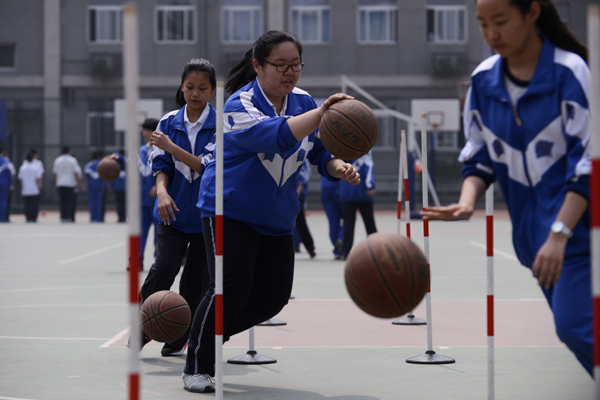Student obesity worsens; myopia still a problem
Obesity among Chinese youth continues to rise, according to the 2014 National Fitness Survey which was released on Wednesday.
And it's lack of exercise, not just access to better food, that is the primary culprit, according to an expert from Peking University.
Despite slight improvements in strength, stamina and aerobic capacity, the survey found that obesity is still rising.
It also cited an increase in myopia, or nearsightedness, among younger students.
The survey, which was jointly conducted by the General Administration of Sport of China and the Ministry of Education, compiled information from 347,294 students from 31 provinces, autonomous regions and municipalities, ranging in age from 7 to 22.
It found that the obesity rate among Chinese students, which has been increasing since 2005, continued upward despite a series of measures to inspire greater sports participation in recent years.
Of the youngsters aged 7 to 12 in urban areas, 18.17 percent of boys and 9.71 percent of girls were found to be obese, an increase since the last survey in 2010.
Ma Jun, director of the Institute of Child and Adolescent Health at Peking University, attributed the trend to ignorance of physical education and a lack of exercise.
"Apart from the influence of improved nutrition and living standards, children are becoming fatter mainly because of a lack of exercise," Ma said.
"Although one hour of exercise for each student could be guaranteed in schools, heavy after-school tutoring still takes up the majority of their spare time."
Meanwhile, myopia continues to hamper younger children.
Almost 30 percent of 7-year-old boys and more than 32 percent of girls were found with myopia. This represents a slight rise for both genders from the 2010 survey.
"It's horrible that children are already poor-sighted when they just start to go to school or even before," said Xing Wenhua, head of the student fitness research group affiliated to the Ministry of Education.
The percentage of students with poor eyesight was 45.71 percent in primary school.
By high school and college the number rose to the mid-80 percent range.
|
 Students are eating better food, but generally do not take enough exercise, a survey has found. Wei Xiaohao / China Daily |
























